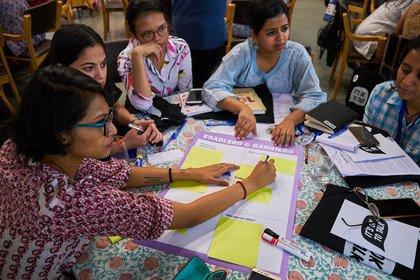
Why we need more research on anxiety- and trauma-related problems
Despite being the mental health condition that affects the most people worldwide, there still isn't enough research on anxiety-related problems. Wellcome’s Inês Pote, Research Lead, and Catherine Sebastian, Head of Evidence for Mental Health, explain how and why we're going to change that.

ljubaphoto / Getty Images
Fear and worry are common emotions. But for the millions of people worldwide experiencing anxiety disorders, the overwhelming anxiety, fear and worry can cause intense distress and prevent people from living the lives they deserve. People who experience trauma, such as exposure to conflict, natural disasters or childhood maltreatment, can also suffer from post-traumatic or acute stress disorder that could persist and likewise affect their quality of life.
There has been progress in our understanding of anxiety- and trauma-related problems over the past few decades. But we still know far too little about why and how these problems develop and resolve, as well as why – for some individuals – they can persist.
Our new funding call, launched in July 2023, aims to change that.
Why is research on anxiety important?
In 2019 it was estimated that over 300 million people, or around 4% of the global population, were living with an anxiety disorder. Despite this, anxiety-related problems remain under-researched and underfunded relative to other mental health problems.
Anxiety also has the earliest onset compared to other mental health disorders, such as depression or schizophrenia.
This early onset, coupled with a tendency for anxiety to develop in tandem with, or as a precursor to, other mental health problems, makes it a key target for early intervention.
It tells us that exploring the causal mechanisms underlying the development, persistence and resolution of anxiety-related problems may be particularly fruitful.
There is already a substantial body of evidence suggesting that many factors contribute to anxiety-related problems, ranging from genetics and traumatic life events to negative social experiences such as bullying and environmental exposures like air pollution.
However, much less is known about the biological, psychological and social causal mechanisms (the processes operating between a causal factor and an outcome) underpinning how and why these factors impact anxiety-related problems over time.
Without an understanding of the causal mechanisms linking these factors with anxiety-related problems, it is much more difficult to develop new and improved ways to predict, identify and intervene in anxiety-related problems early.
Investing in more research in this area will help close this gap.
Our next Mental Health Award
We're funding research to understand how anxiety- and trauma-related problems develop, persist and resolve.
We will fund projects of up to £4 million for up to five years. The funding will be available to applicants based anywhere in the world except mainland China, with preliminary applications due in mid-November 2023.
We’re funding research to help create transformative change in early intervention for anxiety, depression and psychosis.
There are currently no open funding opportunities for Mental Health. Learn more about the funding we provide.
The primary focus of this call is on anxiety and trauma-related disorders, defined here to include:
- generalised anxiety disorder
- panic disorder
- social anxiety disorder
- all types of phobias
- obsessive-compulsive disorder
- post-traumatic stress disorder
- acute stress disorder
- transdiagnostic symptoms strongly associated with the above conditions (for example, threat hyperreactivity, repetitive negative thinking and so on).
This funding call is part of our overarching goal to drive a transformative change in our ability to intervene as early as possible in the course of anxiety, depression and psychosis. The research should be informed by the priorities and needs of those with lived experience of these problems.
We have identified two priorities for this Mental Health Award based on what we think will have the greatest impact. Applicants will need to address at least one of the following:
Research that considers multiple levels of explanation
The causes of and solutions for mental health problems are likely to involve a tangle of biological, psychological and social factors. Integrated approaches are crucial to understanding the causal mechanisms of complex mental health problems more holistically.
We’re interested in funding research that examines questions at more than one level of explanation (for example, molecular, cellular, systems, cognitive, behavioural, social, environmental or societal). While this may require different experimental models (for example, organoid or rodent) as well as human participants, this is not a requirement.
Research in low- and middle-income countries
An estimated 238 million or 79% of people living with anxiety are in low- and middle-income countries, but research in these countries has been underfunded. Annually, less than $2 million is spent on anxiety research in these regions, compared to over $17 million spent on depression.
Without research in these country contexts, we will not be able to create a world in which no one is held back by mental health problems.
We want to fund research in low- and middle-income country contexts. This will help us better understand how different contexts and variables impact the development, persistence and resolution of anxiety-related problems.
Where the research is to take place in a low- and middle-income country, the lead applicant (or co-lead applicant) must be affiliated with an eligible organisation based in that country.
Through this funding call, we hope to be able to advance our understanding of anxiety- and trauma-related problems, which could ultimately lead to early detection and getting the right interventions delivered at the right time.


